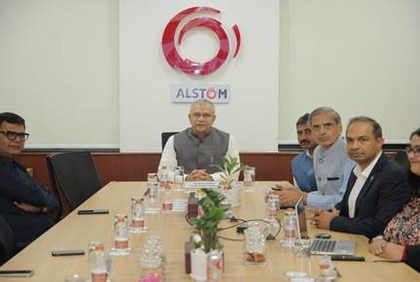India emerging as a major exporter of railway bogies, coaches & locomotives: Vaishnaw
By IANS | Updated: July 27, 2025 22:09 IST2025-07-27T22:01:47+5:302025-07-27T22:09:31+5:30
Vadodara (Gujarat), July 27 Railways Minister Ashwini Vaishnaw said on Sunday that Indian Railways is rapidly emerging as ...

India emerging as a major exporter of railway bogies, coaches & locomotives: Vaishnaw
Vadodara (Gujarat), July 27 Railways Minister Ashwini Vaishnaw said on Sunday that Indian Railways is rapidly emerging as a major exporter of bogies, coaches, locomotives, and propulsion systems under the "Make in India, Make for the World" Vision.
The minister visited Alstom's Savli facility in Vadodara, which is a key manufacturing hub for railway rolling stock in India.
He highlighted that India-made metro coaches have been exported to Australia and Canada, while bogies have been shipped to the UK, Saudi Arabia, France, and Australia. Propulsion systems manufactured in India have been supplied to France, Mexico, Romania, Spain, Germany, and Italy.
Similarly, India-made passenger coaches and locomotives have been exported to countries such as Mozambique, Bangladesh, and Sri Lanka.
Vaishnaw said that the export of railway components to multiple countries is creating significant employment opportunities in India. The Minister further added that Indian engineers and workers are now gaining expertise in international standards, which he described as a major success of the Make in India mission.
He appreciated Alstom’s practice of designing customised solutions for each order - an innovation Indian Railways could emulate - and proposed developing a joint training programme with Gati Shakti Vishwavidyalaya through a creative and collaborative framework.
The minister also suggested that General Managers of all PUs undertake training and exposure visits to Alstom’s Savli unit. Discussions also included the use of sensors and artificial intelligence for preventive maintenance.
Savli facility is producing state-of-the-art commuter and transit train cars, with a strong commitment to the government's Make in India and Aatmanirbhar Bharat initiatives. With a strong focus on innovation and manufacturing excellence, over 3,400 engineers from India are actively collaborating with 21 Alstom sites worldwide. Since 2016, India has successfully exported 1,002 rail cars for various international projects, reinforcing the country’s position as a trusted supplier of modern rail systems. As many as 450 rail cars were manufactured at Savli and exported to Australia for the Queensland Metro project.
The Savli unit has also successfully exported over 3,800 bogies to countries including Germany, Egypt, Sweden, Australia, and Brazil, along with more than 4,000 flatpacks (modules) supplied to Austria. The Maneja unit has made a significant contribution by exporting over 5,000 propulsion systems to various global projects.
India is currently leading 27 international signalling projects and providing support for an additional 40 projects worldwide. Bengaluru's Digital Experience Centre is driving innovation through supporting 120+ projects worldwide, focusing on next-gen signalling using IoT, AI, blockchain, and cybersecurity.
A strong network of leading suppliers supports the manufacturing ecosystem near Savli. Prominent players include Integra, Anovi, Hind Rectifier, Hitachi Energy, and ABB, specialising in fabrication, interiors, and electrical systems.
Speaking to the media, the Union Minister stated that the impact of the "Make in India and Make for the World" initiatives is clearly visible in the Indian Railways manufacturing sector. He highlighted that the export of railway components to multiple countries is creating significant employment opportunities in India. The Minister further added that Indian engineers and workers are now gaining expertise in international standards, which he described as a major success of the Make in India mission.
Disclaimer: This post has been auto-published from an agency feed without any modifications to the text and has not been reviewed by an editor
Open in app